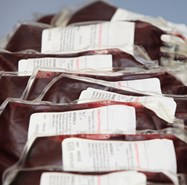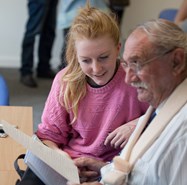Research
-

Detecting bowel cancer early
One million new diagnoses of bowel cancer are made worldwide each year. This human tragedy is costing the NHS more than £1 billion annually. However, a new, simple and cost effective screening test developed by researchers at Imperial College London has proved so effective that this form of cancer could become a rare disease.
Read more >
-

Energy efficiency technologies for our homes
Our homes, and how we live in them, have a significant impact on the environment. The average household creates some six tonnes of CO2 each year, and heating, lighting and power used in domestic buildings produces approximately 27% of the UK’s CO2 emissions. Researchers at the University of Nottingham are developing new technologies to reduce this impact in the future.
Read more >
-

Innovation in transport systems
The UK has one of the busiest rail networks in Europe. Ensuring that trains and their crews are in the right place, to be able to leave at the right time, is crucial to the network running smoothly. In 2008, Tim Burr, head of the National Audit Office, said that train delays cost the UK economy over £1 billion a year.
Read more >
-

Developing new methods of internet communications
Millions of people worldwide use 3G mobile phone networks to talk, send messages or take part in video-conferencing. These are all based on pioneering research at University College London.
Read more >
-

Developing synthetic bone graft products through a successful spin-out
A synthetic bone graft (SBG) material created at Queen Mary University of London (QMUL) is now being used by orthopaedic surgeons worldwide as a bone replacement in hip surgery and in skeletal reconstructions for patients following trauma or disease.
Read more >
-

Reigniting research and development on antibiotics
Antibiotic resistance is a major global concern and, according to the UK Chief Medical Officer, poses a threat equivalent to terrorism. Yet investment in antibiotics R&D is low due to a lack of economic incentives. Researchers at LSE analysed the incentives needed to get antibiotics R&D going again.
Read more >
-

Improving survival rates for people with cystic fibrosis
Cystic fibrosis is an inherited condition, caused by a genetic mutation, which affects 75,000 adults and children worldwide. Research at Queen’s University Belfast led to the development of a transformative new drug, Ivacaftor, which has brought outstanding improvements in survival and quality of life for people with the disease.
Read more >
-

Reducing blood transfusions to lower patient risk, reduce costs and save lives
More than half a million people in the UK receive a blood transfusion each year and demand is increasing. Our ageing population, and a stringent donor selection process, mean the supply of blood is limited. 40% fewer new donors came forward last year compared with a decade ago. Recognising these challenges, researchers at the University of Edinburgh have shown the benefits of reducing the use of blood transfusions in intensive care and surgery.
Read more >
-

Transforming public welfare and attitudes through narrative
Research at the University of Sheffield focusing on the links between memory, trauma and narrative has improved the mental health and well-being of patients in secure hospitals.
Read more >
-

Introducing the Pupil Premium Toolkit
An evidence-based guide for schools in England, developed by researchers at Durham University, has helped ensure that billions of pounds worth of education spending is used effectively to support disadvantaged pupils.
Read more >
-
Out of hours media enquiries
020 3816 1316
-
Dr Tim Bradshaw
tim.bradshaw@russellgroup.ac.uk
020 3816 1300
 X
X
